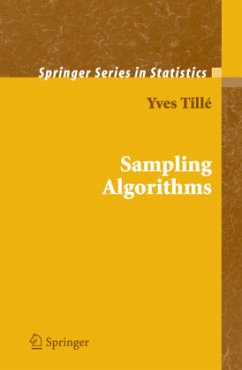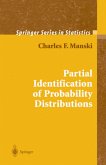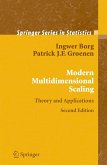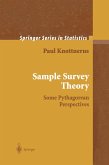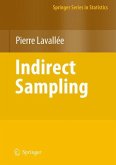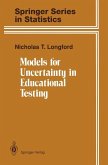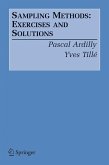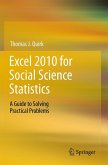Over the last few decades, important progresses in the methods of sampling have been achieved. This book draws up an inventory of new methods that can be useful for selecting samples. Forty-six sampling methods are described in the framework of general theory. The algorithms are described rigorously, which allows implementing directly the described methods. This book is aimed at experienced statisticians who are familiar with the theory of survey sampling.
From the reviews:
"As well as containing much new material, the book succeeds in providing a systematic development for what often seems a collection of isolated and ad hoc methods." A.J. Scott for Short Book Reviews of the ISI, December 2006
"This book draws up an inventory of new methods that can be useful for selecting samples. ... The book is well-organized and lucidly written. It maintains a very high level of mathematical rigor and, at the same time, its contents have direct practical applicability. The numerous examples as well as the extensive list of references will endear it to the readers. Overall, this is an outstanding book which will be of great value to anyone interested in the theory of survey sampling." (Rahul Mukerjee, Zentralblatt MATH, Vol. 1099 (1), 2007)
"This book is a state-of-the-art of sampling techniques different from 'order sampling', and its author takes this opportunity to clarify his own points of view and contribution to the topic, mainly with some emphasis on joint inclusion probabilities and the use of the so-called cube method to select balanced samples. ... Forty-six algorithms are described. The book is clear, easy to read and could be used as a textbook to teach the topic ... ." (Guy Jumarie, Mathematical Reviews, Issue 2007 c)
"A comprehensive overview of ... sampling algorithms, in a very clear and comprehensible way. The concise presentation of many sampling algorithms enables interested practitioners to easily apply or implement the methods in their own programs. ... All readers will find the list of algorithms, abbreviations, and notation very useful. ... Personally, I feel that this book is a must for any survey researcher interested in sample selection procedures. It should be of great interest for practitioners who need to implement surveys ... ." (Ralf Munnich, Journal of the American Statistical Association, Vol. 103 (481), 2008)
"This book is the first one wehave met devoted to the selection of samples for inference in finite populations, based on logical algorithms. The subject of the book is very important since objective inference must be based on a controlled selection of the units to be observed. ... Sampling Algorithms tries to cover some technical reflections on the artificial selection of samples of finite populations, and the author's effort is devoted to this end, which is essential for real and objective statistical science." (Mariano Ruiz Espejo, Journal of Applied Statistics, Vol. 34 (9), 2007)
"The intention of this monograph is to present a rigorous, theory-based catalogue of sampling algorithms, which permits a direct implementation. ... The reader must be ... ready to educate himself in statistical theory, probability, combinatorial theory, including integer mathematical programming and related areas. ... For general evaluation of sampling algorithms, this book is highly recommended ... . Finally one should also mention the claim that all algorithms are available on the Comprehensive R Archive Network." (Götz Uebe, Advances in Statistical Analysis, Vol. 93, 2009)
"As well as containing much new material, the book succeeds in providing a systematic development for what often seems a collection of isolated and ad hoc methods." A.J. Scott for Short Book Reviews of the ISI, December 2006
"This book draws up an inventory of new methods that can be useful for selecting samples. ... The book is well-organized and lucidly written. It maintains a very high level of mathematical rigor and, at the same time, its contents have direct practical applicability. The numerous examples as well as the extensive list of references will endear it to the readers. Overall, this is an outstanding book which will be of great value to anyone interested in the theory of survey sampling." (Rahul Mukerjee, Zentralblatt MATH, Vol. 1099 (1), 2007)
"This book is a state-of-the-art of sampling techniques different from 'order sampling', and its author takes this opportunity to clarify his own points of view and contribution to the topic, mainly with some emphasis on joint inclusion probabilities and the use of the so-called cube method to select balanced samples. ... Forty-six algorithms are described. The book is clear, easy to read and could be used as a textbook to teach the topic ... ." (Guy Jumarie, Mathematical Reviews, Issue 2007 c)
"A comprehensive overview of ... sampling algorithms, in a very clear and comprehensible way. The concise presentation of many sampling algorithms enables interested practitioners to easily apply or implement the methods in their own programs. ... All readers will find the list of algorithms, abbreviations, and notation very useful. ... Personally, I feel that this book is a must for any survey researcher interested in sample selection procedures. It should be of great interest for practitioners who need to implement surveys ... ." (Ralf Munnich, Journal of the American Statistical Association, Vol. 103 (481), 2008)
"This book is the first one wehave met devoted to the selection of samples for inference in finite populations, based on logical algorithms. The subject of the book is very important since objective inference must be based on a controlled selection of the units to be observed. ... Sampling Algorithms tries to cover some technical reflections on the artificial selection of samples of finite populations, and the author's effort is devoted to this end, which is essential for real and objective statistical science." (Mariano Ruiz Espejo, Journal of Applied Statistics, Vol. 34 (9), 2007)
"The intention of this monograph is to present a rigorous, theory-based catalogue of sampling algorithms, which permits a direct implementation. ... The reader must be ... ready to educate himself in statistical theory, probability, combinatorial theory, including integer mathematical programming and related areas. ... For general evaluation of sampling algorithms, this book is highly recommended ... . Finally one should also mention the claim that all algorithms are available on the Comprehensive R Archive Network." (Götz Uebe, Advances in Statistical Analysis, Vol. 93, 2009)

